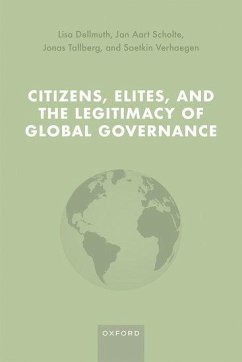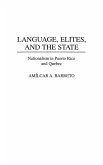Lisa Dellmuth, Jan Aart Scholte, Jonas Tallberg, Soetkin Verhaegen
Citizens, Elites, and the Legitimacy of Global Governance
Lisa Dellmuth, Jan Aart Scholte, Jonas Tallberg, Soetkin Verhaegen
Citizens, Elites, and the Legitimacy of Global Governance
- Gebundenes Buch
- Merkliste
- Auf die Merkliste
- Bewerten Bewerten
- Teilen
- Produkt teilen
- Produkterinnerung
- Produkterinnerung
This book offers the first full comparative study of citizen and elite legitimacy beliefs toward global governance.
Andere Kunden interessierten sich auch für
![Citizens, Democracy, and Markets Around the Pacific Rim Citizens, Democracy, and Markets Around the Pacific Rim]() Doh Chull ShinCitizens, Democracy, and Markets Around the Pacific Rim195,99 €
Doh Chull ShinCitizens, Democracy, and Markets Around the Pacific Rim195,99 €![The New Civil War: Exposing Elites, Fighting Utopian Leftism, and Restoring America The New Civil War: Exposing Elites, Fighting Utopian Leftism, and Restoring America]() Bruce AbramsonThe New Civil War: Exposing Elites, Fighting Utopian Leftism, and Restoring America22,99 €
Bruce AbramsonThe New Civil War: Exposing Elites, Fighting Utopian Leftism, and Restoring America22,99 €![Friends, Citizens, Strangers Friends, Citizens, Strangers]() Richard VernonFriends, Citizens, Strangers113,99 €
Richard VernonFriends, Citizens, Strangers113,99 €![Enraged Citizens, European Peace and Democratic Deficits: Or Why the Democracy Given to Us Must Become One We Fight for Enraged Citizens, European Peace and Democratic Deficits: Or Why the Democracy Given to Us Must Become One We Fight for]() Robert MenasseEnraged Citizens, European Peace and Democratic Deficits: Or Why the Democracy Given to Us Must Become One We Fight for13,99 €
Robert MenasseEnraged Citizens, European Peace and Democratic Deficits: Or Why the Democracy Given to Us Must Become One We Fight for13,99 €![Citizens, Context, and Choice Citizens, Context, and Choice]() Citizens, Context, and Choice172,99 €
Citizens, Context, and Choice172,99 €![Elites, Crises, and the Origins of Regimes Elites, Crises, and the Origins of Regimes]() Elites, Crises, and the Origins of Regimes78,99 €
Elites, Crises, and the Origins of Regimes78,99 €![Language, Elites, and the State Language, Elites, and the State]() Amilcar BarretoLanguage, Elites, and the State80,99 €
Amilcar BarretoLanguage, Elites, and the State80,99 €-
-
-
This book offers the first full comparative study of citizen and elite legitimacy beliefs toward global governance.
Hinweis: Dieser Artikel kann nur an eine deutsche Lieferadresse ausgeliefert werden.
Hinweis: Dieser Artikel kann nur an eine deutsche Lieferadresse ausgeliefert werden.
Produktdetails
- Produktdetails
- Verlag: Hurst & Co.
- Seitenzahl: 282
- Erscheinungstermin: 19. Dezember 2022
- Englisch
- Abmessung: 241mm x 163mm x 22mm
- Gewicht: 590g
- ISBN-13: 9780192856241
- ISBN-10: 0192856243
- Artikelnr.: 66136690
- Herstellerkennzeichnung
- Libri GmbH
- Europaallee 1
- 36244 Bad Hersfeld
- gpsr@libri.de
- Verlag: Hurst & Co.
- Seitenzahl: 282
- Erscheinungstermin: 19. Dezember 2022
- Englisch
- Abmessung: 241mm x 163mm x 22mm
- Gewicht: 590g
- ISBN-13: 9780192856241
- ISBN-10: 0192856243
- Artikelnr.: 66136690
- Herstellerkennzeichnung
- Libri GmbH
- Europaallee 1
- 36244 Bad Hersfeld
- gpsr@libri.de
Lisa Dellmuth is Associate Professor of International Relations at Stockholm University. She obtained her PhD from the University of Mannheim in 2011. Her research focuses on aid, legitimacy, and environmental politics in global governance. Her research is published in journals such as the American Political Science Review, British Journal of Political Science, European Union Politics, Review of International Organizations, and Proceedings of the National Academy of Sciences of the U.S.A. Dellmuth is the author of Is Europe Good for You? EU Spending and Well-Being (Policy Press, 2021), which examines the effects of EU spending on citizen well-being, with implications for legitimacy perceptions of the EU. Jan Aart Scholte is Professor of Global Transformations and Governance Challenges at Leiden University and Co-Director of the Centre for Global Cooperation Research at the University of Duisburg-Essen. He held previous positions at the University of Gothenburg, University of Warwick, London School of Economics (Centennial Professor), Institute of Social Studies, and University of Sussex. His research interests include globalization, global governance, civil society in global politics, global democracy, and Internet governance. Jan has published extensively, taken research to many practitioner circles, and is a former lead editor of the journal Global Governance. Jonas Tallberg is Professor of Political Science at Stockholm University. His primary research interests are global governance and European Union politics. He is the principal investigator of the research program "Legitimacy in Global Governance" (LegGov). Tallberg's books include Legitimacy in Global Governance: Sources, Processes, and Consequences (OUP, 2018, co-edited), The Opening Up of International Organizations: Transnational Access in Global Governance (CUP, 2013, co-authored), and Leadership and Negotiation in the European Union (CUP, 2006). His articles have appeared in journals such as American Political Science Review, International Organization, International Studies Quarterly, British Journal of Political Science, Review of International Organizations, and European Journal of International Relations. Soetkin Verhaegen is Assistant Professor in European Politics at the Faculty of Arts and Social Sciences, Department of Political Science, at Maastricht University. Her main research subjects are citizens' perceptions of (il)legitimacy of governing institutions in the context of multilevel governance, European identity, youth, and political socialization. Soetkin is principal investigator in the GLOBPOL project on citizens' attitudes towards globalization and multilevel governance. She is specialized in survey research and focus groups. Her work has been published in journals such as American Political Science Review, Journal of Common Market Studies , European Journal of International Relations, European Political Science Review, and Comparative European Politics.
Part I. Introduction and Design
1: Legitimacy in Global Governance
2: Researching Legitimacy Beliefs
Part II. Mapping Legitimacy Beliefs toward IOs
3: Mapping Citizen Legitimacy Beliefs
4: Mapping Elite Legitimacy Beliefs
5: Mapping the Elite-Citizen Gap
Part III. Explaining Legitimacy Beliefs toward IOs
6: An Individual-Level Approach to Legitimacy Beliefs
7: Explaining Citizen Legitimacy Beliefs
8: Explaining Elite Legitimacy Beliefs
9: Explaining the Elite-Citizen Gap
Part IV. Conclusion
10: Legitimacy and the Future of Global Governance
1: Legitimacy in Global Governance
2: Researching Legitimacy Beliefs
Part II. Mapping Legitimacy Beliefs toward IOs
3: Mapping Citizen Legitimacy Beliefs
4: Mapping Elite Legitimacy Beliefs
5: Mapping the Elite-Citizen Gap
Part III. Explaining Legitimacy Beliefs toward IOs
6: An Individual-Level Approach to Legitimacy Beliefs
7: Explaining Citizen Legitimacy Beliefs
8: Explaining Elite Legitimacy Beliefs
9: Explaining the Elite-Citizen Gap
Part IV. Conclusion
10: Legitimacy and the Future of Global Governance
Part I. Introduction and Design
1: Legitimacy in Global Governance
2: Researching Legitimacy Beliefs
Part II. Mapping Legitimacy Beliefs toward IOs
3: Mapping Citizen Legitimacy Beliefs
4: Mapping Elite Legitimacy Beliefs
5: Mapping the Elite-Citizen Gap
Part III. Explaining Legitimacy Beliefs toward IOs
6: An Individual-Level Approach to Legitimacy Beliefs
7: Explaining Citizen Legitimacy Beliefs
8: Explaining Elite Legitimacy Beliefs
9: Explaining the Elite-Citizen Gap
Part IV. Conclusion
10: Legitimacy and the Future of Global Governance
1: Legitimacy in Global Governance
2: Researching Legitimacy Beliefs
Part II. Mapping Legitimacy Beliefs toward IOs
3: Mapping Citizen Legitimacy Beliefs
4: Mapping Elite Legitimacy Beliefs
5: Mapping the Elite-Citizen Gap
Part III. Explaining Legitimacy Beliefs toward IOs
6: An Individual-Level Approach to Legitimacy Beliefs
7: Explaining Citizen Legitimacy Beliefs
8: Explaining Elite Legitimacy Beliefs
9: Explaining the Elite-Citizen Gap
Part IV. Conclusion
10: Legitimacy and the Future of Global Governance








